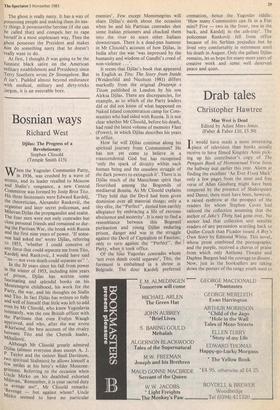Bosnian ways
Richard West
Djilas: The Progress of a Revolutionary Stephen Clissold (Temple Smith £15)
When the Yugoslav Communist Party, in 1936, was crushed by a wave of arrests, and its leader recalled to Moscow and Stalin's vengeance, a new Central Committee was formed by Josip Bros Tito. His three lieutenants were Edward Kardelj, the theoretician, Alexander Rankovie, the organiser and later secret policeman, and Milovan Djilas the propagandist and zealot. The four men were not only comrades but close personal friends and remained so dur- ing the Partisan War, the break with Russia and the first nine years of power. 'If some- one had asked me' wrote Djilas, referring to 1953, 'whether I could conceive of any force that could separate me from Tito, ,Kardelj and. Rankovie, 1 would have said
,
no — not even death could separate us" '. In the 30 years since his fall from power In the winter of 1953, including nine years of prison, Djilas has written some fascinating and splendid books on his Montenegrin childhood, his work for the Party, the war, and his thoughts on Stalin and Tito. In fact Djilas has written so fully and well of himself that little was left to add even by Mr Clissold, who knew Yugoslavia intimately, was the one British officer with the Partisans that even Evelyn Waugh anpfoved, and who, after the war wrote Whir/wind, the best account of the rivalry between Tito and the Chetnik leader, Mihailovie.
Although Mr Clissold greatly admired Djilas (almost everyone does except A. J. P. Taylor and the sinister Basil Davidson, two spiritual Stalinists) he allows himself a few smiles at his hero's wilder Montene- grinisrns. Referring to the occasion when Uncle Mirko on his deathbed exhorted Milovan, 'Remember, it is your sacred duty 10 avenge met', Mr Clissold remarks:
, Revenge — but against whom? Uncle Mirko seemed to have no particular enemies'. Few except Montenegrins will share Djilas's mirth about the occasion when he and his Partisan comrades shot some Italian prisoners and chucked them into the river to scare other Italians downstream. There is a dead-pan humour in Mr Clissold's account of how Djilas, in India after the war 'was impressed by the humanity and wisdom of Gandhi's creed of non-violence
It seems that Djilas's book that appeared in English as Tito: The Story from Inside (Weidenfeld and Nicolson 1981) differs markedly from the original Druzenje s Thom published in London by his son Aleksa Djilas. There are discrepancies, for example, as to which of the Party leaders did or did not know of what happened on Naked Island concentration camp for Com- munists who had sided with Russia. It is not clear whether Mr Clissold, before his death, had read the latest volume of memoirs Vlast (Power), in which Djilas describes his years in office.
How far will Djilas continue along his spiritual journey from Communism? He has not yet come to believe in a transcendental God but has recognised 'only the spark of divinity within each human being and the ceaseless struggle of the dark powers to extinguish it'. There is in Djilas much of the Manichean spirit that flourished among the Bogomils of mediaeval Bosnia. As Mr Clissold explains 'They held that the Devil had been given dominion over all material things; only a tiny elite, the "Perfect", denied him earthly allegiance by embracing a life of extreme abstinence and austerity'. It is easy to find a resemblance between this Bogomil puritanism and young Djilas enduring prison, danger and war in the struggle against the Devil of Capitalism or Fascism; only to turn against the "Perfect", the Party, when it took office.
Of the four Yugoslav comrades whom 'not even death could separate', Tito, the foremost is embalmed in a shrine in Belgrade. The dour Kardelj preferred
cremation, hence the Yugoslav riddle: 'How many Communists can fit in a Fiat mini? Five — two in the front, two in the back, and Kardelj in the ash-tray'. The policeman Rankovie fell from office because of his Serbian prejudice but he lived very comfortably in retirement until his death in August. Only the gallant Djilas remains, let us hope for many more years of creative work and some well deserved peace and quiet.














































 Previous page
Previous page